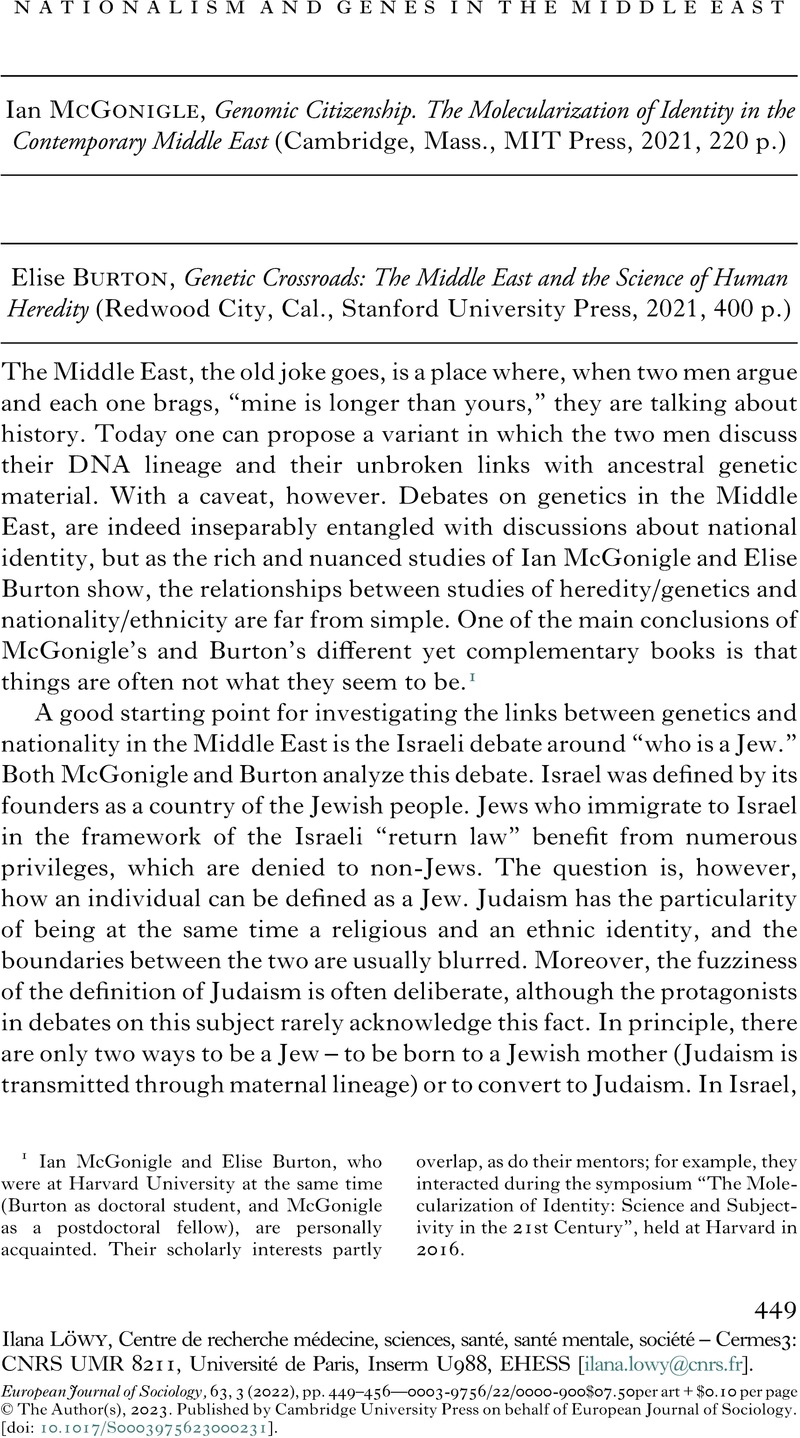No CrossRef data available.
Published online by Cambridge University Press: 19 April 2023

1 Ian McGonigle and Elise Burton, who were at Harvard University at the same time (Burton as doctoral student, and McGonigle as a postdoctoral fellow), are personally acquainted. Their scholarly interests partly overlap, as do their mentors; for example, they interacted during the symposium “The Molecularization of Identity: Science and Subjectivity in the 21st Century”, held at Harvard in 2016.
2 “Cyprus weddings” are chosen not only by couples unable to marry in Israel, but also by those who wish to have a civil rather than a religious ceremony.
3 Burton, Elise, 2015, “An assimilating majority? Israeli marriage, law and identity in the Jewish State”, Journal of Jewish Identities, 8 (1): 73–94 CrossRefGoogle Scholar. The rules that govern marriage in Israel are only briefly mentioned in Burton’s book.
4 McGonigle, Ian, 2015, “Jewish genetics’ and the ‘nature’ of Israeli citizenship”, Transversal: Journal for Jewish Studies, 13 (2): 90–102 CrossRefGoogle Scholar; McGonigle, Ian and Herman, Lauren, 2015, “Genetic citizenship: DNA testing and the Israeli Law of Return”, Journal of Law and the Biosciences, 2 (2): 469–478 CrossRefGoogle ScholarPubMed; pages 38-60 in Ian McGonigle, 2021, cf. infra. See also Nurit Kirsh and Yael Hashiloni Dolev, 2021, “mtDNA tests as a vehicle for Jewish recognition of Former Soviet Union Israeli citizens: religious and political debate”, Biosocieties [https://doi.org/10.1057/s41292-021-00228-6].
5 Kahn, Susan Martha, 2005, “The multiple meanings of Jewish genes”, Culture, Medicine and Psychiatry, 29 (2): 179–192 CrossRefGoogle ScholarPubMed.
6 I put this sentence in the past tense because it cannot be ruled out that the globalization trends of the first 20 years of the 21st century will be modified—although, one may assume, not entirely reversed— as a result of recent geopolitical developments.
7 Burton comments on genome projects in the Middle East in her article: Burton, Elise, 2018a, “Narrating ethnicity and diversity in Middle Eastern national genome projects”, Social Studies of Science, 48 (5): 762–786 CrossRefGoogle ScholarPubMed.
8 Page 123, in Burton, Elise, 2018b, “Essential Collaborators”: Locating Middle Eastern Geneticists in the Global Scientific Infrastructure, 1950s-1970s”, Comparative Studies in Society and History, 60 (1): 119–149 CrossRefGoogle Scholar.
9 Burton 2018: 148. Her point of view is inspired by Anderson, Warwick and Pols, Hans, 2012, “Scientific Patriotism: Medical Science and National Self-Fashioning in Southeast Asia”, Comparative Studies in Society and History, 54, 1: 93–113 CrossRefGoogle Scholar.
10 On the continued devalorization of researchers from “developing countries” by Western scientists, in spite of an official discourse about “partnership”, see e.g. Giessler, Wenzel, 2013, “Public secrets in public health: Knowing not to know while making scientific knowledge”, American Ethnologist, 40 (1) : 13–34 CrossRefGoogle Scholar.
11 Page 45, in Lindee, Susan, “Human genetics after the bomb: Archives, clinics, proving grounds and board rooms”, Studies in History and Philosophy of Biological and Biomedical Sciences, 2016, 55: 45–53 CrossRefGoogle ScholarPubMed.